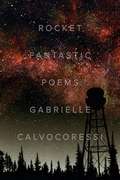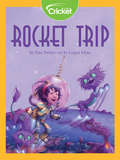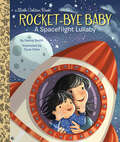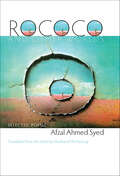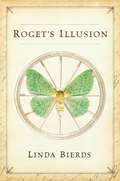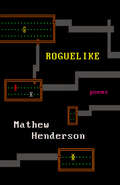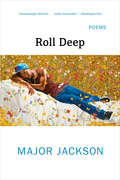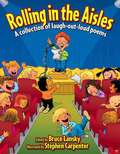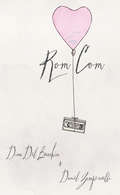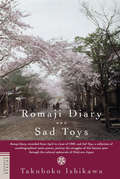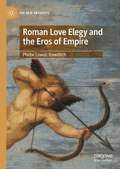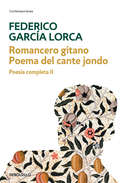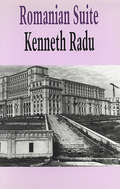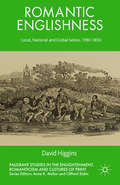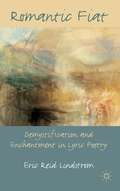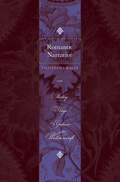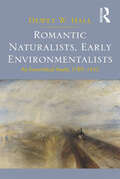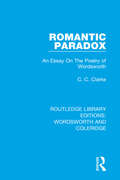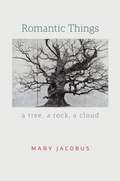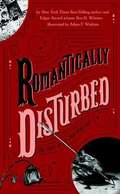- Table View
- List View
Rocket Fantastic: Poems
by Gabrielle CalvocoressiFrom the author of The Last Time I Saw Amelia Earhart, a spellbinding reinvention of self, family, and gender. <P><P>Like nothing before it, Rocket Fantastic reinvents the landscape and language of the body in interconnected poems that entwine a fabular past with an iridescent future by blurring, with disarming vulnerability, the real and the imaginary. Sorcerous, jazz-tinged, erotic, and wide-eyed, this is a pioneering work by a space-age balladeer.
Rocket Trip
by Tina TwitoHop in your rocket ship for a trip to the stars! In this fantasy rhyming poem about flying through space, readers will visit Mars, the purple kitties of the planet Fuzz, and an asteroid inhabited by dinosaurs—all in plenty of time to return home for lunch!
Rocket-Bye Baby: A Spaceflight Lullaby (Little Golden Book)
by Danna SmithWhen stars begin to twinkle in the night sky, it's time for an outer-space lullaby. A perfect bedtime read to celebrate the 50th anniversary of the moon landing!Rocket-bye, Baby, up to the moon. Nighttime is falling; sleep will come soon.We'll climb in the spaceship and that's where we'll stay,snuggled up close as we're carried away. . . . Join a mother and her baby as they fly in their own little rocket through a star-filled night sky, past constellations and meteor showers, in this dreamy good-night book. A gentle rhyme and beautiful artwork of stars and planets and mother and child make this a perfect good-night book when the stars come out.
Rocks of Hampi: Poems of Chandrasekhar Kambar
by Chandrasekhar Kambar O. L. NagabhushanaThe book is an anthology of poems on and about children, poems that sing of love for this "unattainable earth" as Milosz puts it.
Rococo and Other Worlds: Selected Poems (The Driftless Series)
by Afzal Ahmed SyedAfzal Ahmed Syed holds a unique place among contemporary poets of the Urdu language, as an acknowledged master of both the classical and modern Urdu poetic forms. The poems in Rococo and Other Worlds explore the mythology and historical realities of South Asia and the Middle East; their bold imagery creates narratives of voluptuous perfection, which remain inseparable from the political realities that Syed witnessed as a young observer of the violent separation of East Pakistan and emergence of Bangladesh in 1971 and of the Lebanese civil war in 1976. Musharraf Ali Farooqi's sensitive translations bring this extraordinary work to English readers for the first time.
Roget's Illusion
by Linda Bierds"Her poems, with their constantly surprising delicacy and their language rich with insight and a sensuous music, radiate real power and authority and animal presence. ” -W. S. Merwin (U. S. Poet Laureate, 2010 -2011) He is best known for his Thesaurus of English Words and Phrases, but among filmmakers Roget is better known for his explanation of the optical illusion that still bedevils them: Why does a wheel moving forward always seem on film to be running backward? For Linda Bierds, the illusion also refers to our relationship to language, to our belief that words hold something more than their definitions. Why do we strive to articulate the world even as we know this is a shifting and illusory pursuit? Why do we continue to seek perfection, pursue beauty, yearn for immortality? Roget’s Illusion offers no answer. It simply shows the striving. .
Roguelike
by Mathew HendersonMathew Henderson explores with remarkable insight the unique logics of video games and addiction in his much-anticipated sophomore poetry collection.Mathew Henderson’s Roguelike, the much-anticipated follow-up to his acclaimed 2012 debut The Lease, melds the unique online vocabulary, culture, and logic of video games with family and addiction narratives, specifically the poet’s relationship with his mother and her struggle with narcotics. The resulting poems are arresting and fresh, mining game mythology, fantasy, and family history, while exploring the rich connection between video gaming and notions of addiction, repetition, storytelling, and escapism.Though the poems are largely narrative, ultimately Roguelike is less about stories themselves than it is about the psychological and emotional forces that define how and why we make them — how we’re all moved to shape the disparate and seemingly unconnected events of our lives into something meaningful, to make sense of the past and the present through storytelling.
Roll Deep: Poems
by Major JacksonThis breakthrough volume appropriates the vernacular notion of "rolling deep" to explore human intimacy and war. In his fourth collection, a breakthrough volume, Major Jackson appropriates the vernacular notion of "rolling deep" to capture the spirit of aesthetic travel that defines these forceful new poems and brazenly announces his steady accretion of literary and artistic influences, both formal and experimental--his "crew." The confident and radiant poems in Roll Deep address a range of topics, most prominently human intimacy and war. And like his best work to date, these poems create new experiences with language owed to Jackson's willingness to once again seek a rhythmic sound that expresses the unique realities of the twenty-first century with humor and understanding. Whether set in Nairobi, Madrid, or Greece, the poems are sensuously evocative and unapologetically with-it, in their effort to build community across borders of language and style. From Urban Renewal, "The Dadaab Suite": I have come to Dadaab like an actor on a press release, unprepared for the drained faces of famine-fleeing refugees, my craft's glamour dimmed by hundreds of infant graves, children whose lolling heads' final drop landed on their mothers' backs like soft stones. What beauty can I spell in this swelter of dust?
Rolling in the Aisles
by Bruce Lansky Stephen CarpenterGobs of giggles, ladles of laughter! This revised collection of funny poems by beloved poets such as Bruce Lansky, Kenn Nesbitt, Robert Pottle, Eric Ode, Ted Scheu, and Dave Crawley will have both kid-size and grownup-size readers rolling in the aisles with laughter!
Rom Com
by Daniel Zomparelli Dina Del BucchiaAt precisely the cultural moment you were hoping for, a dream team of smart, sexy, brunette, West Coast poets of Italian descent has passionately co-authored an intelligent collection of poetry that both celebrates and capsizes the romantic comedy.From the origin of the genre (It Happened One Night) to its contemporary expressions (Love Actually), the poems in Rom Com trace the attempt to deconstruct as well as engage in dialogue with romantic comedy films and the pop culture, celebrities, and tropes that have come to be associated with them. These irreverent, playful, weird, and comedic poems come in a variety of forms, fully engaging in pop culture, without a judgmental tone. They see your frumpy expectations and raise you issues of sexuality, consent, sexism, homophobia, race, and class. They explore the highs and lows of romantic relationships and the expectations and realities of love, tackling real emotional worlds through the lens of film.Two cool people wrote it. Dina Del Bucchia, the fashionable and voluptuous, is a woman on the go, brazenly hosting literary events and tweeting about otters and award shows. Daniel Zomparelli, the handsome and dashing, is a young, gay man-about-Vancouver who somehow also quietly edits (in chief) a semi-annual poetry journal. (Ship them all you want, fools.)How to tell if you are compatible with this book: Are you equally versed in literature and pop culture? Are you a film-savvy fan of contemporary poetry? Are you an academic with interest in literature and cultural studies? Are you in general a cool, sad person? This book might just be the sassy best friend you've wanted.
Romaji Diary and Sad Toys
by Sanford Goldstein Takuboku IshikawaThe novella Romaji Diary represents the first instance of a Japanese writer using romaji (roman script) to tell stories in a way that could not betold in kana or kanji. Sad Toys is a collection of 194 Tanka, the traditional 31- syllable poems that are evocative of Japan's misty past and its tentative steps into the wider world.
Roman Love Elegy and the Eros of Empire (The New Antiquity)
by Phebe Lowell BowditchThis book explores Roman love elegy from postcolonial perspectives, arguing that the tropes, conventions, and discourses of the Augustan genre serve to reinforce the imperial identity of its elite, metropolitan audience. Love elegy presents the phenomena and discourses of Roman imperialism—in terms of visual spectacle (the military triumph), literary genre (epic in relation to elegy), material culture (art and luxury goods), and geographic space—as intersecting with ancient norms of gender and sexuality in a way that reinforces Rome’s dominance in the Mediterranean. The introductory chapter lays out the postcolonial frame, drawing from the work of Edward Said among other theorists, and situates love elegy in relation to Roman Hellenism and the varied Roman responses to Greece and its cultural influences. Four of the six subsequent chapters focus on the rhetorical ambivalence that characterizes love elegy’s treatment of Greek influence: the representation of the domina or mistress as simultaneously a figure for ‘captive Greece’ and a trope for Roman imperialism; the motif of the elegiac triumph, with varying figures playing the triumphator, as suggestive of Greco-Roman cultural rivalry; Rome’s competing visions of an Attic and an Asiatic Hellenism. The second and the final chapter focus on the figures of Osiris and Isis, respectively, as emblematic of Rome’s colonialist and ambivalent representation of Egypt, with the conclusion offering a deconstructive reading of elegy’s rhetoric of orientalism.
Romancero gitano | Poema del cante jondo (Poesía completa #2)
by Federico García LorcaRomancero gitano | Poema del cante jondo es el segundo volumen de la Biblioteca Federico García Lorca que reúne su obra completa, y el segundo que compila su «Poesía completa». En este libro, se ofrecen al lector clásicos lorquianos como el Romancero gitano o el Poema del cante jondo, junto con las dos conferencias pronunciadas por el poeta en la presentación de los mismos, además de las Odas y su primera colección de Poemas sueltos. La edición y los prólogos, a cargo de Miguel García Posada, permiten al lector acercarse a la complejidad de su obra y disfrutar, a lo largo de los siete volúmenes que componen esta Biblioteca Federico García Lorca, de uno de los autores españoles más relevantes del siglo XX. Pablo Neruda dijo...«Desde ese tiempo en que los españoles del pueblo besaban el hábito de Lope de Vega no se ha conocido en lengua española una seducción tan inmensa dirigida a un poeta.» --------------------------------------------------------------------------BIBLIOTECA FEDERICO GARCÍA LORCA Poesía competa:1. Libro de poemas | Primeras canciones | Canciones2. Romancero gitano | Poema del cante jondo3. Poeta en Nueva York | Sonetos Teatro completo:4. La zapatera prodigiosa | Mariana Pineda5. El público | Así que pasen cinco años6. Bodas de sangre | Yerma7. La casa de Bernarda Alba | Doña Rosita la soltera--------------------------------------------------------------------------
Romancero gitano | Poema del cante jondo (Poesía completa #Volumen 2)
by Federico García LorcaRomancero gitano | Poema del cante jondo es el segundo volumen de la Biblioteca Federico García Lorca que reúne su obra completa, y el segundo que compila su «Poesía completa». En este libro, se ofrecen al lector clásicos lorquianos como el Romancero gitano o el Poema del cante jondo, junto con las dos conferencias pronunciadas por el poeta en la presentación de los mismos, además de las Odas y su primera colección de Poemas sueltos.La edición y los prólogos, a cargo de Miguel García Posada, permiten al lector acercarse a la complejidad de su obra y disfrutar, a lo largo de los siete volúmenes que componen esta Biblioteca Federico García Lorca, de uno de los autores españoles más relevantes del siglo XX. Pablo Neruda dijo...«Desde ese tiempo en que los españoles del pueblo besaban el hábito de Lope de Vega no se ha conocido en lengua española una seducción tan inmensa dirigida a un poeta.»--------------------------------------------------------------------------BIBLIOTECA FEDERICO GARCÍA LORCA Poesía competa:1. Libro de poemas | Primeras canciones | Canciones2. Romancero gitano | Poema del cante jondo3. Poeta en Nueva York | SonetosTeatro completo:4. La zapatera prodigiosa | Mariana Pineda5. El público | Así que pasen cinco años6. Bodas de sangre | Yerma7. La casa de Bernarda Alba | Doña Rosita la soltera--------------------------------------------------------------------------
Romanian Suite
by Kenneth RaduIn linked poems of great individual power, Kenneth Radu addresses the matter of Romania, the country of his ancestors, summoning figures from myth, distant and recent history, and the arts. The cast of characters includes Dracula, Prince Vlad the Impaler, and the devil -- all related to Ceausescu himself -- as well as an immigrant and his wife, and the great Romanian pianists Dinu Lipatti and Radu Lupu, and a bride who courageously battles the devil for control of her wedding. These interweave with a narrator in the present -- a gardener-pianist -- to create a long poem that is both an exorcism and a celebration, an enactment of the human capacity to survive and regenerate spiritually.
Romantic Englishness: Local, National and Global Selves, 1780-1850 (Palgrave Studies in the Enlightenment, Romanticism and Cultures of Print)
by D. HigginsRomantic Englishness investigates how narratives of localised selfhood in English Romantic writing are produced in relation to national and transnational formations. This book focuses on autobiographical texts by authors such as John Clare, Samuel Taylor Coleridge, William Hazlitt, Charles Lamb, and William Wordsworth.
Romantic Fiat
by Eric Reid LindstromIn the Romantic period's economics of 'fiat' money the legacy of romanticism involves absolutist gestures of verbal fiat. Focused on William Wordsworth, but in constant range of his poet-successors and modern critics, Romantic Fiat presents an argument for a double romantic signature of 'let there be' and 'let be. '
Romantic Narrative: Shelley, Hays, Godwin, Wollstonecraft
by Tilottama RajanOften identified with its lyric poetry, Romanticism has come to be dismissed by historicists as an ineffectual idealism. By focusing on Romantic narrative, noted humanist Tilottama Rajan takes issue with this identification, as well as with the equation of narrative itself with the governmental apparatus of the Novel. Exploring the role of narrativity in the works of Romantic writers, Rajan also reflects on larger disciplinary issues such as the role of poetry versus prose in an emergent modernity and the place of Romanticism itself in a Victorianized nineteenth century.While engaging both genres, Romantic Narrative responds to the current critical shift from poetry to prose by concentrating, paradoxically, on a poetics of narrative in Romantic prose fiction. Rajan argues that poiesis, as a mode of thinking, is Romanticism’s legacy to an age of prose. She elucidates this thesis through careful readings of Shelley’s Alastor and his Gothic novels, Godwin’s Caleb Williams and St. Leon, Hays’ Memoirs of Emma Courtney, and Wollstonecraft’s The Wrongs of Woman. Rajan, winner of the Keats-Shelley Association's Distinguished Lifetime Award and a fellow of the Royal Society of Canada, is one of Romanticism’s leading scholars. Effective, articulate, and readable, Romantic Narrative will appeal to scholars in both nineteenth-century studies and narrative theory.
Romantic Naturalists, Early Environmentalists: An Ecocritical Study, 1789-1912
by Dewey W. HallIn his study of Romantic naturalists and early environmentalists, Dewey W. Hall asserts that William Wordsworth and Ralph Waldo Emerson were transatlantic literary figures who were both influenced by the English naturalist Gilbert White. In Part 1, Hall examines evidence that as Romantic naturalists interested in meteorology, Wordsworth and Emerson engaged in proto-environmental activity that drew attention to the potential consequences of the locomotive's incursion into Windermere and Concord. In Part 2, Hall suggests that Wordsworth and Emerson shaped the early environmental movement through their work as poets-turned-naturalists, arguing that Wordsworth influenced Octavia Hill’s contribution to the founding of the United Kingdom’s National Trust in 1895, while Emerson inspired John Muir to spearhead the United States’ National Parks movement in 1890. Hall’s book traces the connection from White as a naturalist-turned-poet to Muir as the quintessential early environmental activist who camped in Yosemite with President Theodore Roosevelt. Throughout, Hall raises concerns about the growth of industrialization to make a persuasive case for literature's importance to the rise of environmentalism.
Romantic Paradox: An Essay on the Poetry of Wordsworth (RLE: Wordsworth and Coleridge #2)
by C.C. ClarkeFirst published in 1962, this book reveals unexpected complexity or equivocation in Wordsworth’s use of certain key words, particularly ‘image’, ‘form’ and ‘shape’. The author endeavours to show that this complexity is related to the poet’s awareness of the ambiguity of the perceptual process. Numerous passages from The Prelude and other poems are analysed to illustrate the argument and to show that, because of this doubt or hidden perplexity, Wordsworth’s poetry has a far richer texture, is more concentrated, intricately organised and loaded with ambivalent meanings than it would otherwise have been. New light is also shed on Wordsworth’s debt to Akenside.
Romantic Things: A Tree, A Rock, A Cloud
by Mary JacobusOur thoughts are shaped as much by what things make of us as by what we make of them. Lyric poetry is especially concerned with things and their relationship to thought, sense, and understanding. In Romantic Things, Mary Jacobus explores the world of objects and phenomena in nature as expressed in Romantic poetry alongside the theme of sentience and sensory deprivation in literature and art. Jacobus discusses objects and attributes that test our perceptions and preoccupy both Romantic poetry and modern philosophy. John Clare, John Constable, Rainer Maria Rilke, W. G. Sebald, and Gerhard Richter make appearances around the central figure of William Wordsworth as Jacobus explores trees, rocks, clouds, breath, sleep, deafness, and blindness in their work. While she thinks through these things, she is assisted by the writings of Maurice Merleau-Ponty, Jacques Derrida, and Jean-Luc Nancy. Helping us think more deeply about things that are at once visible and invisible, seen and unseen, felt and unfeeling, Romantic Things opens our eyes to what has been previously overlooked in lyric and Romantic poetry.
Romantic Things: a tree, a rock, a cloud
by Mary JacobusOur thoughts are shaped as much by what things make of us as by what we make of them. Lyric poetry is especially concerned with things and their relationship to thought, sense, and understanding. In Romantic Things, Mary Jacobus explores the world of objects and phenomena in nature as expressed in Romantic poetry alongside the theme of sentience and sensory deprivation in literature and art. Jacobus discusses objects and attributes that test our perceptions and preoccupy both Romantic poetry and modern philosophy. John Clare, John Constable, Rainer Maria Rilke, W. G. Sebald, and Gerhard Richter make appearances around the central figure of William Wordsworth as Jacobus explores trees, rocks, clouds, breath, sleep, deafness, and blindness in their work. While she thinks through these things, she is assisted by the writings of Maurice Merleau-Ponty, Jacques Derrida, and Jean-Luc Nancy. Helping us think more deeply about things that are at once visible and invisible, seen and unseen, felt and unfeeling, Romantic Things opens our eyes to what has been previously overlooked in lyric and Romantic poetry.
Romantic Tragedies
by Reeve ParkerTroubled politically and personally, Wordsworth and Coleridge turned in 1797 to the London stage. Their tragedies, The Borderers and Osorio, were set in medieval Britain and early modern Spain to avoid the Lord Chamberlain's censorship. Drury Lane rejected both, but fifteen years later, Coleridge's revision, Remorse, had spectacular success there, inspiring Shelley's 1819 Roman tragedy, The Cenci, aimed for Covent Garden. Reeve Parker makes a striking case for the power of these intertwined works, written against British hostility to French republican liberties and Regency repression of home-grown agitation. Covertly, Remorse and The Cenci also turn against Wordsworth. Stressing the significance of subtly repeated imagery and resonances with Virgil, Shakespeare, Racine, Jean-François Ducis and Schiller, Parker's close readings, which are boldly imaginative and decidedly untoward, argue that at the heart of these tragedies lie powerful dramatic uncertainties driven by unstable passions - what he calls, adapting Coleridge's phrase for sorcery, 'dark employments'.
Romantically Disturbed: Love Poems to Rip Your Heart Out
by Ben H. Winters Adam F. WatkinsLove Poems to Rip Your Heart OutFind a love to die for with Edgar Award winner Ben H. Winters's 30 haunting love poems. Accompanied by Adam F. Watkins's beautifully horrifying illustrations, these eerie poems reveal that love is not always what it seems to be . . .
